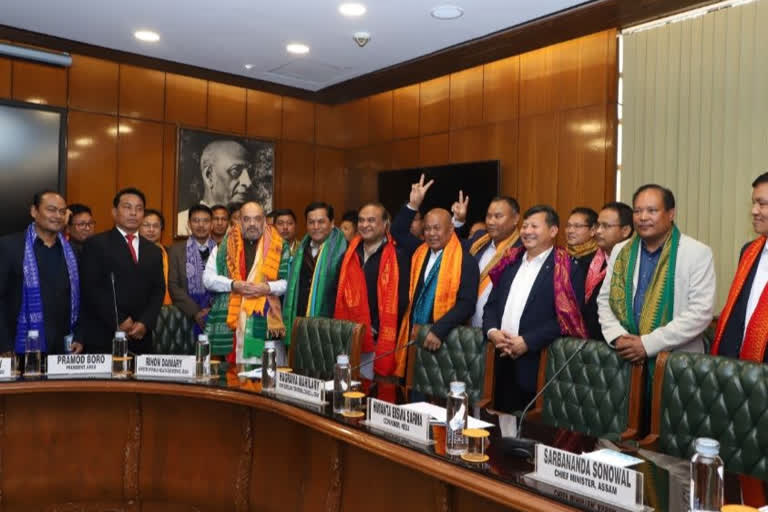Hyderabad: The northern bank of the Brahmaputra River in Assam is the battlefield for 15 lakh Bodos, fighting for their sovereignty. In the fights between the insurgent groups and the government, several citizens have lost their lives over the years.
Putting an end to the decades-long separatist battles, the central, as well as the government of Assam, have signed the Bodo peace accord with four factions of National Democratic Front of Bodoland (NDFB). Along with NDFB, All Bodo Students’ Union (ABSU) and United Bodo People’s Organization (UBPO) have also signed the peace accord in New Delhi in the presence of Union Home Minister Amit Shah, who said that the separatist grievances are outdated and that Assam’s territorial integrity is assured.
The existing Bodoland Territorial Area Districts (BTAD) will be renamed as Bodoland Territorial Council (BTC). A commission will be appointed for the inclusion of 3,000 villages adjacent to BTAD, based on the population census. National Sports University, Railway Coach factory, medical college and cancer hospital will be established in the region.
Including the Bodos living in the hill districts in the ST list, ensuring the safety of Bodo language by notifying it as an 'associate official language' in Assam are the key points of this peace agreement.
As several organisations called for Assam Bandh opposing the formation of Union Territorial Council covering BTAD and other districts of Assam, the ABSU is tightlipped about demands for a special state.
Under these circumstances, observers are sceptical about this peace accord.
At a time when anti-CAA protests are shaking the Northeast to its core, this agreement comes as a respite for the BJP squad, especially in Assam. In the last 27 years, three tripartite agreements were signed pertaining to the Bodoland issue. This shows the geographical complexities and the severity of the group’s demands.
The formation of Bodo Security Force in 1981 by Ranjan Daimary and the subsequent attacks of ABSU demanding special state for the ethnic tribes have stirred Assam. The movement which started with demands for constitutional protection of the tribes and development of Bodo areas has taken a turn towards separatism after Assamese was declared the official language of the state.
In February 1993, a tripartite agreement was signed for the creation of the Bodoland Autonomous Council (BAC). Shortly after this accord, the NDFB withdrew from it and launched an ethnic cleansing campaign. In 2003, the second accord was signed for establishing the BTC, comprising of four districts. NDFB declined the offer once again and continued its violent means.
Though the latest accord instils hope, there are apprehensions that the past might repeat itself.
After independence from the British rule, the Northeastern region of British India consisted of Assam and princely states of Nagaland, Meghalaya and Mizoram. Manipur and Tripura remained as Union Territories from 1956 until 1972. The states in the Northeastern region are officially recognised under the North Eastern Council as the acting agency for their development.
Also read: Karnataka BJP MP comment over freedom movement sparks storm
Being a cradle of 238 ethnic groups, this region is constantly plagued by threats of invasion and cultural suppression. Apprehensions of being underdeveloped than the rest of the country is another reason for constant socio-political battles.
Though the central government is optimistic about restoration of peace in Assam, the Nath-Yogi community began a new demand for ST categorisation. Meanwhile, another indigenous tribe Garos demanded a separate autonomous council for their rights. Several other groups are miffed about the government’s stance on Bodos. The Centre must achieve an amicable solution to restore peace once and for all.



